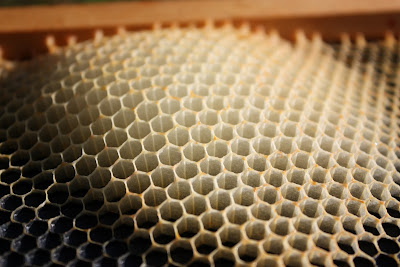
The bees have been hard at work all summer, a very hot, humid and dry summer at that. Perfect for bees! The hive is almost 2 years old now and I fully expected there to be honey and sure enough there was when I opened the hive for inspection the other day.
Spring and early summer's flowers have nectar flowing which allows the bees to make honey whereas most of the summer there are no nectar producing plants in this area. The next round of nectar producing flowers will be golden rod that is just starting to bloom and will soon make the bees drunk on both pollen and nectar. I will remind you that nectar is 70% water and 30% sugar and the bees have worked at it all summer to flip those number by drying the nectar turning it to 70% sugar and 30% water which is actual honey. The bees have also capped a good portion of what they made for storage. The frames with capped honey are quite heavy. And those with uncapped honey glisten in the late day, late summer sun. Simply gorgeous. There was something quite hypnotic and peaceful about opening the hive to find very mellow bees that seemed to be enjoying summer as much as I was. I barely needed the smoker to calm them. All in all the hive looks good.
There are 10 frames in each of the upper "super" boxes where the honey is made and the bees had filled about 2/3 of each. Interestingly though they fill the middle frames and leave the outer frames. My friend Steve tells me that they prefer to move up when completed with a frame rather than out. I simply did some re-arranging in hopes of getting them to use more of the frames now that the golden rod is about to put them into overtime.
I doubt that I will extract any honey from the hive this year even though it is so strong but in my opinion not quite strong enough and I really want them to have a nice supply for winter. Perhaps next year. For me bee-keeping is a hobby and I have no intentions of selling the honey. We would use it here for ourselves only and if I have any leftover my friend Timm wants to make some mead (beer made from honey) with it. I truly love the fact that this hive is doing a very small part in making the environment better. Remember that without bees our food supply in fruits and veggies would not exist. Think of what that would do to both humans and other animals.
Side note: all those nasty ground "bees" (most likely hornets) that you are finding in your yard that are uber aggressive are not honeybees and are not as important to our eco-system. They are nasty hornets that will attack and sting without much warning. If they pose any threat to you, your family or pets take them out.
The first 2 photos and the 1 at the top are of unfilled comb. It is stunning in its beauty and complex simplicity (think about that).
Here in the upper left you can see where the bees have capped the honey. The lower right is what the beautiful golden honey looks like prior to capping. The smell is intoxicating.
In this photo looking down into the hive between frames you can see just how close together they are. The frames become connected as the bees "glue" the frames together using a substance they make called propolis. I have to use a hive tool that looks like a paint scraper or chisel to separate and move them around. The glue is VERY strong!
This frame probably weighed at least 5 pounds as it was full of capped honey. These bees couldn't have cared less that I was pulling the frames out, moving them around, etc. They didn't fly away but stayed on the frames continually doing their work.
A side shot/end on shot of what the capped honey looks like.



































